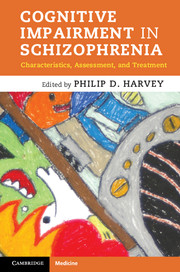Book contents
- Cognitive Impairment in Schizophrenia
- Cognitive Impairment in Schizophrenia
- Copyright page
- Contents
- Contributors
- Preface
- Abbreviations
- Section 1 Characteristics of cognitive impairment in schizophrenia
- Section 2 Functional implications and course
- Section 3 Genetic and biological contributions to cognitive impairment
- Section 4 Assessment and treatment of cognitive impairment and related features
- Chapter 13 Assessment of cognition in schizophrenia treatment studies
- Chapter 14 Performance-based measures of functioning in schizophrenia
- Chapter 15 Pharmacological approaches to cognitive enhancement
- Chapter 16 Computerized cognitive training in schizophrenia: current knowledge and future directions
- Index
Chapter 15 - Pharmacological approaches to cognitive enhancement
from Section 4 - Assessment and treatment of cognitive impairment and related features
Published online by Cambridge University Press: 05 February 2013
- Cognitive Impairment in Schizophrenia
- Cognitive Impairment in Schizophrenia
- Copyright page
- Contents
- Contributors
- Preface
- Abbreviations
- Section 1 Characteristics of cognitive impairment in schizophrenia
- Section 2 Functional implications and course
- Section 3 Genetic and biological contributions to cognitive impairment
- Section 4 Assessment and treatment of cognitive impairment and related features
- Chapter 13 Assessment of cognition in schizophrenia treatment studies
- Chapter 14 Performance-based measures of functioning in schizophrenia
- Chapter 15 Pharmacological approaches to cognitive enhancement
- Chapter 16 Computerized cognitive training in schizophrenia: current knowledge and future directions
- Index
Summary
Keywords
Information
- Type
- Chapter
- Information
- Cognitive Impairment in SchizophreniaCharacteristics, Assessment and Treatment, pp. 266 - 283Publisher: Cambridge University PressPrint publication year: 2013
Accessibility standard: Unknown
Why this information is here
This section outlines the accessibility features of this content - including support for screen readers, full keyboard navigation and high-contrast display options. This may not be relevant for you.Accessibility Information
- 1
- Cited by
